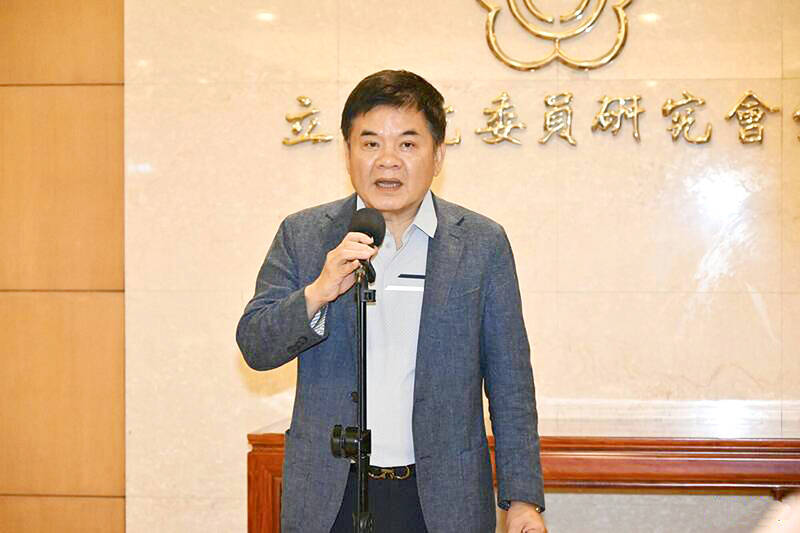A Chinese Nationalist Party (KMT) bill to shorten the pre-election media blackout period from 10 days to three could open the door to foreign interference, Democratic Progressive Party (DPP) Legislator Chuang Jui-hsiung (莊瑞雄) said on Sunday.
KMT Legislator Weng Hsiao-ling (翁曉玲) introduced draft amendments to Article 53 of the Public Officials Election and Recall Act (公職人員選舉罷免法), saying that no evidence shows pre-election polls influence voters’ decisions.
Most countries with similar restrictions limit the publication of polls to one to six days before voting, and many have moved to shorten that period, Weng said.

Photo: Taipei Times file photo
Her bill seeks to protect the public’s right to know, in line with the Constitution’s protection of freedom of speech, she said.
The bill passed its preliminary review in December last year after KMT lawmakers blocked DPP members from entering the meeting room and approved it unanimously in the legislature’s Internal Administration Committee.
The proposed three-day blackout period might appear to enhance transparency, but would weaken safeguards against the spread of fake polls and external manipulation, Chuang said.
The 10-day blackout period is designed to prevent fabricated polls from influencing election results, he said, adding that reducing it to three days would leave insufficient time to fact-check and counter misinformation.
Given China’s long history of using disinformation and fake polls to manipulate public opinion in Taiwan, the potential risks should be carefully considered, he said.
While the public’s right to know is important, national security and electoral integrity must also be ensured, he added.
If the blackout period is shortened, fact-checking mechanisms, penalties and media self-regulation must also be enhanced; otherwise, more false polls could circulate, Chuang said, urging the governing and opposition parties to evaluate the proposal cautiously.
Citizen Congress Watch executive director Chang Hung-lin (張宏林) on Sunday said that shortening the blackout period could create social disruption ahead of elections.
China has interfered in Taiwan’s elections, and even the KMT has acknowledged the problem, he said, citing former Broadcasting Corp of China chairman Jaw Shaw-kong (趙少康), who condemned China for allegedly employing online operatives to manipulate the KMT’s chairperson election.
Taiwan currently lacks legal provisions to penalize people who fabricate election polls, Chang said.
The legislature should focus on amending regulations to penalize the dissemination of fake polls rather than shortening the blackout period, which could further polarize society during elections, he said.
The influence of external disinformation and fake social media accounts on Taiwan’s elections should also be addressed, he added.

The Executive Yuan yesterday announced that registration for a one-time universal NT$10,000 cash handout to help people in Taiwan survive US tariffs and inflation would start on Nov. 5, with payouts available as early as Nov. 12. Who is eligible for the handout? Registered Taiwanese nationals are eligible, including those born in Taiwan before April 30 next year with a birth certificate. Non-registered nationals with residence permits, foreign permanent residents and foreign spouses of Taiwanese citizens with residence permits also qualify for the handouts. For people who meet the eligibility requirements, but passed away between yesterday and April 30 next year, surviving family members

The German city of Hamburg on Oct. 14 named a bridge “Kaohsiung-Brucke” after the Taiwanese city of Kaohsiung. The footbridge, formerly known as F566, is to the east of the Speicherstadt, the world’s largest warehouse district, and connects the Dar-es-Salaam-Platz to the Brooktorpromenade near the Port of Hamburg on the Elbe River. Timo Fischer, a Free Democratic Party member of the Hamburg-Mitte District Assembly, in May last year proposed the name change with support from members of the Social Democratic Party and the Christian Democratic Union. Kaohsiung and Hamburg in 1999 inked a sister city agreement, but despite more than a quarter-century of

Taiwanese officials are courting podcasters and influencers aligned with US President Donald Trump as they grow more worried the US leader could undermine Taiwanese interests in talks with China, people familiar with the matter said. Trump has said Taiwan would likely be on the agenda when he is expected to meet Chinese President Xi Jinping (習近平) next week in a bid to resolve persistent trade tensions. China has asked the White House to officially declare it “opposes” Taiwanese independence, Bloomberg reported last month, a concession that would mark a major diplomatic win for Beijing. President William Lai (賴清德) and his top officials

‘ONE CHINA’: A statement that Berlin decides its own China policy did not seem to sit well with Beijing, which offered only one meeting with the German official German Minister for Foreign Affairs Johann Wadephul’s trip to China has been canceled, a spokesperson for his ministry said yesterday, amid rising tensions between the two nations, including over Taiwan. Wadephul had planned to address Chinese curbs on rare earths during his visit, but his comments about Berlin deciding on the “design” of its “one China” policy ahead of the trip appear to have rankled China. Asked about Wadephul’s comments, Chinese Ministry of Foreign Affairs spokesman Guo Jiakun (郭嘉昆) said the “one China principle” has “no room for any self-definition.” In the interview published on Thursday, Wadephul said he would urge China to